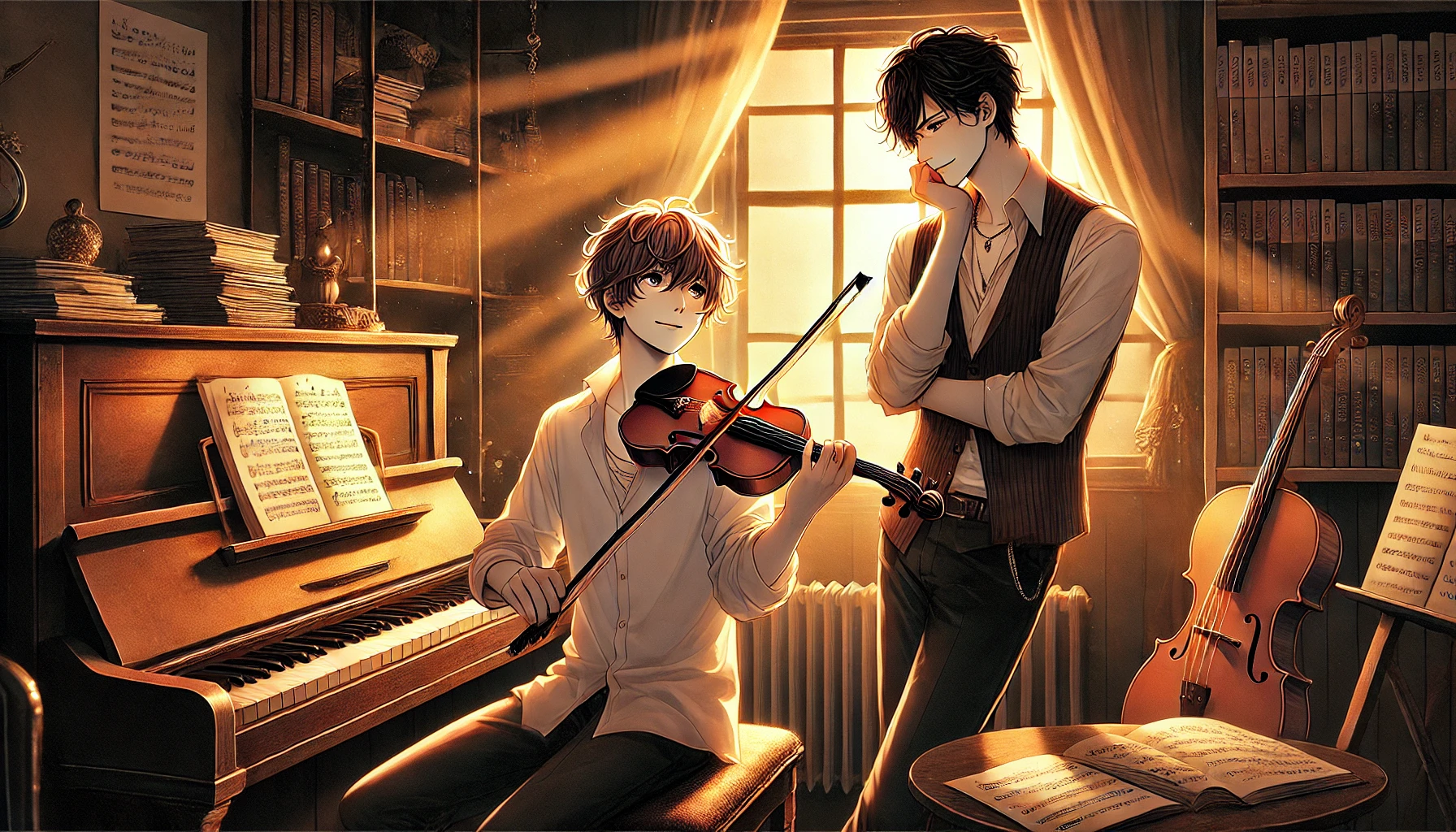Prologue
In the quiet coastal town of Hakodate, music filled the air from a small music studio perched above a record shop. Haru Nakamura, a shy violinist who worked as a music teacher, spent his days composing pieces inspired by the waves that crashed along the shore. Across the street, the town’s bustling theater hosted touring performances, and with it came Kaito Arai, a charismatic and ambitious stage actor looking for a fresh start.
Act 1: Meeting Through Music
One late afternoon, Haru stayed late in the studio, playing his violin with closed eyes, pouring his emotions into every note. Down below, Kaito walked past, his gaze drawn upward by the hauntingly beautiful melody.
Unable to resist, Kaito stepped into the record shop and asked the owner, “Who’s playing up there?”
“That’s Haru. He’s one of the best violinists I’ve ever heard, but he rarely performs in public.”
Intrigued, Kaito climbed the narrow staircase to the studio. Haru was startled when the door creaked open. His bow froze mid-stroke as he looked up to see a tall man with disheveled black hair and piercing blue eyes leaning casually against the frame.
“Don’t stop,” Kaito said, his voice deep yet playful. “You’re amazing.”
Haru flushed, fumbling to put his violin down. “I—I didn’t know anyone was listening.”
“Now you do,” Kaito replied with a grin. “I’m Kaito. And you?”
“Haru,” he mumbled, his voice barely above a whisper.
Act 2: Bridging Two Worlds
Despite their stark differences, Kaito began visiting Haru at the studio almost daily, bringing coffee and staying to listen. Kaito would often share tales of his time in the theater, while Haru quietly listened, captivated by Kaito’s confidence and charm.
One day, Kaito brought an idea. “I have a new show coming up—a modern adaptation of Orpheus and Eurydice. Would you compose the music?”
Haru hesitated. “I’ve never written for a play before. I’m not sure I’m good enough.”
Kaito leaned closer, his gaze unwavering. “You are. I’ll be there every step of the way.”
Reluctantly, Haru agreed, and the two began working together late into the nights. Slowly, Haru opened up about his insecurities, and Kaito revealed the struggles he faced hiding behind his confident façade.
Act 3: Tension and Trust
As the premiere approached, the pressure mounted. Haru struggled to finish the final piece, doubting himself more with each passing day. One evening, after a particularly heated argument, Haru lashed out.
“You don’t understand what it’s like! You’re so confident, so perfect on stage. I’m just a nobody with a violin.”
Kaito’s expression softened, and he gently cupped Haru’s face. “Do you think I’ve never doubted myself? Every time I step on stage, I’m terrified. But when I hear your music, it’s like everything else disappears. You make me brave.”
Haru’s walls crumbled, and he finally confessed, “I’m scared to fail you.”
“You could never fail me,” Kaito whispered, pulling him into a tender embrace.
Act 4: A Symphony of Love
On opening night, Haru watched nervously from the wings as Kaito performed. When the moment came for the climactic scene, Haru’s violin solo filled the theater, echoing with the raw emotion they had poured into the piece.
As the final note lingered in the air, the audience erupted in applause. Kaito turned toward the wings, his gaze locking onto Haru’s. He mouthed, “You did it.”
After the show, Kaito found Haru backstage, pulling him into a tight hug. “We did it,” Haru corrected with a small smile.
Kaito leaned in, his voice soft. “If this is what we can create together, I want to keep making music with you. Not just for the stage, but for life.”
Haru’s heart raced as he replied, “Then let’s start now.”
Epilogue
Years later, Haru and Kaito became a renowned duo, combining music and theater in ways that captivated audiences worldwide. In the small studio where it all began, a framed program from their first performance of Orpheus and Eurydice hung on the wall.
And on quiet nights, Haru would play his violin for Kaito, their love a melody that never faded.


Leave a Reply